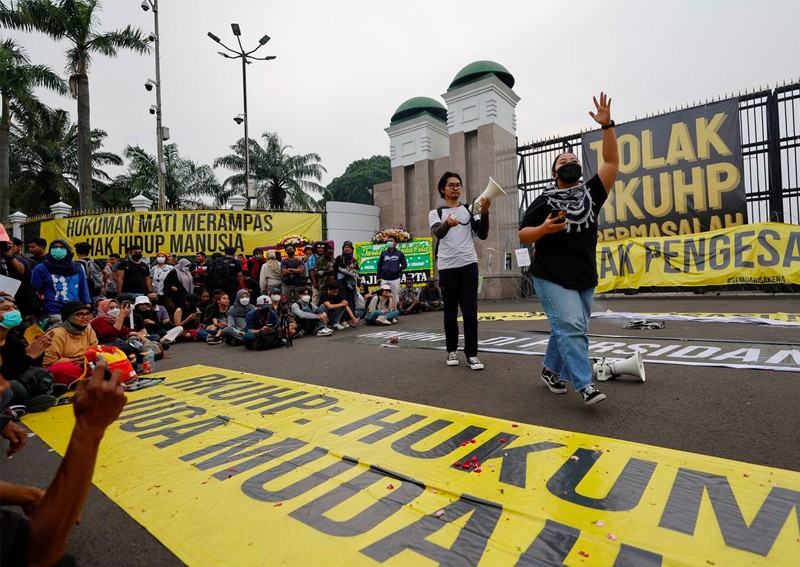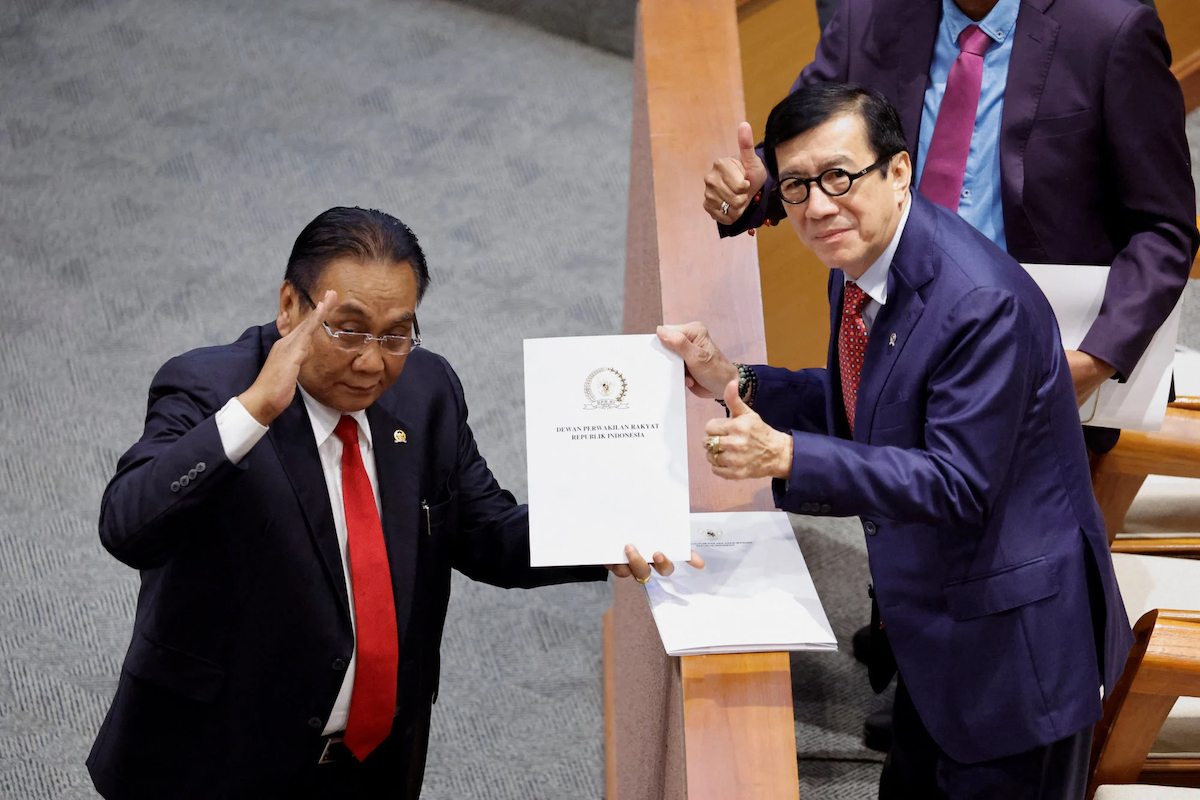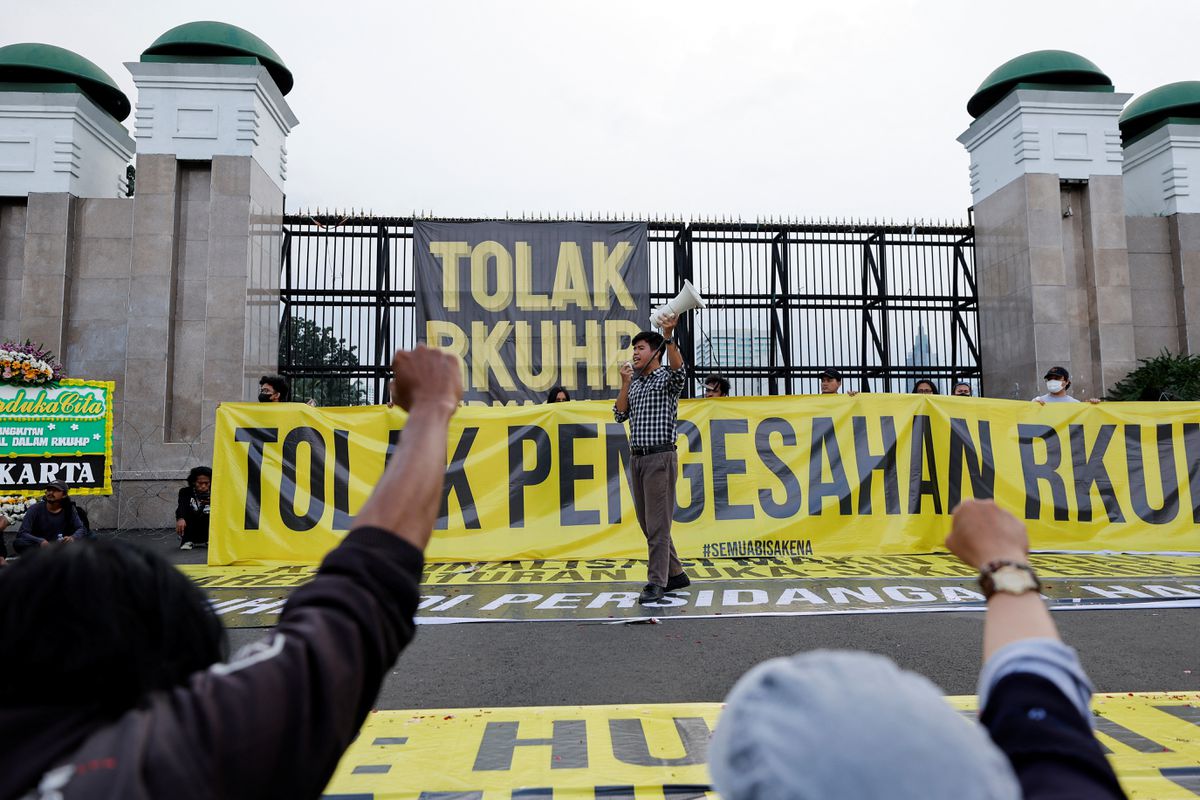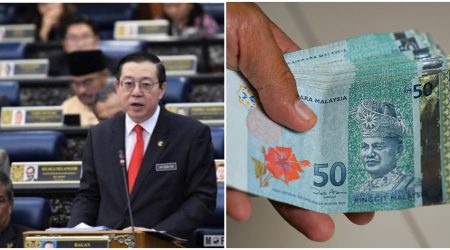‘Destruction of democracy itself’: Indonesian activists decry curbs to sex and free speech under new criminal code

Indonesia has passed into law a controversial criminal code that human rights activists and civil groups say could potentially send the world’s third-largest democracy back to authoritarian rule.
Articles viewed as problematic include bans on insulting the president, vice-president and state institutions, views that contradict the state ideology Pancasila, protests without a permit, sex outside marriage and non-marital cohabitation.
“Indonesia is moving towards a new authoritarian direction. Under Jokowi, there were a series of setbacks that led to the destruction of democracy itself,” said Muhamad Isnur, chairman of Indonesian Legal Aid foundation (YLBHI), referring to President Joko Widodo’s nickname.
Recent protests by civil groups outside the House of Representatives did not stop the bill from being unanimously passed into law on Tuesday (Dec 6), even as the Islamic-leaning Prosperous Justice Party (PKS) and Democratic Party said they had caveats about some articles.
“It is within the people’s rights to criticise the government,” said PKS’ Iskan Qolba Lubis on the articles banning insults about the president. “I will bring these articles [for judicial review] to the Constitutional Court.”
Santoso from the Democratic Party appealed to the government to “guarantee the fulfilment of people’s rights” and ensure “the implementation of the criminal code will not harm society through regulations that have the potential to criminalise them”.
Indonesia has been using a century-old Dutch-era criminal code even after independence in 1945. Since 1963, seven presidents including Widodo and 19 judicial ministers had attempted to create a fresh criminal code.
“Dutch-era legal products are no longer relevant to Indonesia. This criminal code bill has been very reformative, progressive, and also responsive to the current situation in Indonesia,” minister of law and human rights Yasonna Laoly said on Tuesday.
The new penal code contains 624 articles, fewer than the 632 in the draft issued in July. The government claimed it had spent the past years gathering feedback from stakeholders, experts and the public following a nationwide protest against the code in 2019.
The new code, which applies to Indonesians and foreigners alike, will be effective three years after the bill is passed into law. Opponents can file requests for judicial review of the code to the Constitutional Court.
Setback for democracy

Civil groups and human rights activists have for years decried the new criminal code bill as another tool that Jakarta could use to suppress dissent and freedom of speech.
Article 188, for example, broadens the number of banned ideologies in Indonesia to “other ideologies that contradict Pancasila”. Those who spread and develop these ideologies will face a maximum of four years’ imprisonment, or seven if their goal is to replace Pancasila with these theories.
Pancasila is a set of five principles forming the foundational, philosophical theory of Indonesia and used as a benchmark to create the country’s laws.
Asked what ideologies were considered as contradicting Pancasila, Albert Aries, a spokesman for the government’s new penal code drafting team, told This Week in Asia that he “does not want to name them, I will let the media interpret that themselves”.
“We use ‘other ideologies’ as a blanket term for all the other ideologies that could replace our state ideology. The matter of implementation [of this article] is up to the court,” Aries said.
Muhamad of YLBHI said the article allowed for “multiple interpretations that could be used to ensnare and criminalise government critics and human rights activists”.
He also criticised the ban on insulting the president or vice-president, although the penalty was reduced to three years in prison from the earlier 3.5 years in the July draft.
“The article that bans insults against the president is left over from the colonial era, and it was [founding father and Indonesia’s first president] Sukarno’s dream to rid the country of this article, why are we still maintaining it? I thought the government wanted to decolonialise the penal code.”
Clement Voule, the United Nations’ Special Rapporteur Freedom of Association, said in a tweet he was “very concerned” that the new code “would further erode the freedoms of peaceful assembly & association”.
“I urge authorities and call on [the House of Representatives] to ensure the criminal code complies with international standards by amending all articles that could impede on human rights,” Voule added.
Aries denied the civil groups’ claim that the articles banning non-Pancasila ideologies and insults about the president were “rubber articles”.
“Criticising the president’s policies will not be penalised. But I think in any country in the world, it’s intrinsically wrong to insult the president. Under the new penal code, there will be no legal process without complaints from the president and vice-president themselves,” Aries said.
Articles banning non-Pancasila ideologies were included to “protect our state ideology and to cultivate a sense of nationalism in every citizen”, he added.
Growing religious conservatism

The changes are seen as a boon for religious conservatism, with activists saying the state is now supervising citizens’ private lives.
Extramarital sex is now punishable by a one-year imprisonment, while those engaged in non-marital cohabitation could face up to six months in prison.
According to Aries, such acts could only be reported by certain people, such as a spouse, parent or child of the offenders, and “third parties and other people cannot take the law into their own hands”.
On non-marital cohabitation, Aries said the government’s goal was to protect children and spouses of individuals in adultery cases, and facilitate taxation on incomes of the cohabitants.
Muhamad of YLBHI disagreed, saying the changes could trigger vigilante action by those who viewed the acts as a sin.
“Living together is not a crime. It depends on each religion’s norms. Now it falls under the norm of criminal law, which means there is acknowledgement by the state that this is a sin that deserves to be punished,” Muhamad said.












Leave a Reply